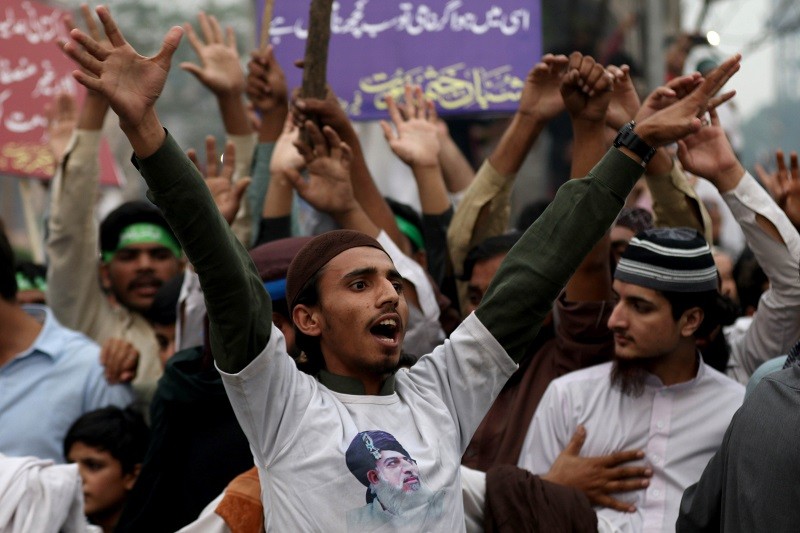
Whether TLP has emerged strong or weak in the aftermath of Aasia’s acquittal is a relevant question to ask

Though religious parties almost unanimously condemned the recent Supreme Court’s decision acquitting Aasia Bibi, none of them could mobilise its cadre like the Tehreek-e-Labbaik Pakistan (TLP) that almost shut the country down for three days. The way the government handled this matter and held negotiations with the religious group forcing it to end its sit-in and the group’s own response have raised the question whether TLP has emerged strong or weak in the aftermath of Aasia’s acquittal.
Since its formation in 2015, TLP has come to be known for its street power and ability to hold massive protests. Though formed before the hanging of Mumtaz Qadri -- the policeman who assassinated Salmaan Taseer, Governor of the Punjab in 2011 -- it rose to fame after Qadri’s hanging in 2016.
On October 31, as the decision was announced in the morning, messages on behalf of TLP leadership started spreading on the social media, declaring the judges liable to be killed (wajibul qatl) and asking the army to disobey its chief. Within hours, major cities were shut down where protesters disrupted life and destroyed private property.
Islamabad-based author Arshad Mehmood who specialises in religion and culture considers government’s and state institutions’ response towards TLP weak and compromising. "The [administrative] mishandling of protesters has reinforced the perception that TLP is under safe wings and cannot be touched whatever it does. It would, surely, increase party’s religious and political strength -- to be utilised at the right time.
"Elements stimulating hatred, extremism and violence are not under check; arresting a few from the lowest tier is nothing but delusion."
The party gained popularity on the issue of Khatm-e-Nabuwwat. Naturally, blasphemy is a central issue for the hardline party which calls for blasphemers to be put to death and has sided with those who murdered alleged perpetrators.
Spokesperson TLP Lahore, Peer Ijaz Ashrafi rejects the perception that his party has used Aasia Bibi’s case to increase its political strength. "The only purpose of our lives is to protect the honour of our beloved Prophet (pbuh). If the government dares to violate the agreement by letting Aasia leave the country, conditions might worsen."
Ashrafi denies any links with power corridors. "Our leadership has expressed absolute adulation for the Prophet (pbuh), sincerity to the constitution and state. TLP does not serve any institute or personality; our only aim is to impose sharia law in the country through political process."
The TLP had earlier blocked a major artery into the capital for three weeks running in November 2017 over a minor change in the oath of legislators that the TLP leadership claimed amounted to ‘blasphemy’. The demonstrators eventually forced the resignation of the then federal law minister Zahid Hamid and signed a deal with the government that granted amnesty to its activists for violence during protests.
Author and journalist Khaled Ahmed considers the rise of Barelvis in politics as one of the outcomes of what he calls "our jihad policy". The Barelvi school of thought "has been strong in the cadres of our military which was the key, perhaps, behind the reluctance to take action against the TLP during the 2017 sit-in and the current shutdown. The increasing level of religiosity amongst our forces is not only guarding TLP and its leadership but also helping it to secure more political ground".
The dramatic rise of TLP in general election 2018 has surprised many. It has emerged as the fifth largest party in terms of number of votes at the national level; and third largest in Punjab. TLP fielded 571 candidates; of them 178 for the National Assembly. According to GALLUP Exit Poll 2018, TLP grabbed 2.2 million votes in the election.
Also read: Protest politics
"The party has been exploiting sensitive issues like Khatm-e-Nabuwwat, Blasphemy and Sharia Law. This approach has empowered TLP with the strength of street power. The recent occasion has proved the party can cripple the whole country and there will be nobody to act against them," says journalist Mubasher Bukhari.
While politicians like Nehal Hashmi and Faisal Raza Abidi are not allowed to utter a single sentence against the power corridors of the country and are made an example of, Bukhari says, "TLP leadership can say and do anything in the name of religion, increasing the party’s grip in Punjab. It is also an emerging threat to other religious political parties".
Federal government has started a crackdown against miscreants in different parts of the country. Cases against more than 5000 persons have been registered in Islamabad, Karachi, Lahore, Sargodha, Faisalabad, Chiniot and Okara, including the TLP leaders Allama Khadim Hussain Rizvi and Pir Afzal Qadri.
PTA (Pakistan Telecommunication Authority) and FIA (Federal Investigation Agency) are also instructed by the government to take action against those involved in promoting hate speech on social media.
However, Ashrafi claims that the Punjab government has halted arresting workers across the province and arrested members would be released soon. "If the government dares to arrest the TLP leadership, thousands of people would not hesitate to sacrifice their lives for the beloved leadership. Besides, the government must revisit its support for blocking Khadim Rizvi’s twitter handle."